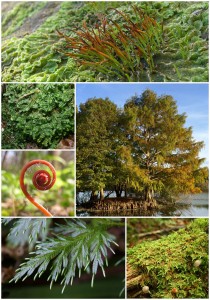 New NSF grant for flagellate plant phylogenetics and associated education research!
New NSF grant for flagellate plant phylogenetics and associated education research!
Dr. Emily Sessa and co-PIs Dr. Gordon Burleigh, Dr. Stuart McDaniel, and Dr. Christine Davis have received notice that a proposal titled “Collaborative Research: Building a Comprehensive Evolutionary History of Flagellate Plants ($2,321,452)” has been recommended for funding through NSF’s Genealogy of Life (GoLife) program.
Project abstract:
For the first ~300 million years of plant life on land, Earth’s flora consisted entirely of flagellate plants, which today include approximately 30,000 species of bryophytes, lycophytes, ferns, and gymnosperms. Numerous major innovations, including stomata, vascular tissue, roots and leaves, woody stems, and seeds, evolved first in flagellate plant ancestors. The flagellate plants not only provide a window to the early evolution of these critical features, but are represented today by vibrant and diverse lineages that contribute substantially to global ecology, particularly via contributions to global carbon and nitrogen cycles.
This project will improve our understanding of the history and relationships of the flagellate plants by using new sequencing technologies to produce a species-level phylogeny for these taxa that is linked to an immense and varied amount of data on fossils, phenomic characters, and geospatial distributions. Education experts will develop an online educational tool for training the next generation of biodiversity scientists by providing an accessible framework for using the project data in university classrooms while promoting evidence-based teaching practices. A MicroPlants citizen science project will promote scientific literacy and plant awareness in the general public, through museums and schools.